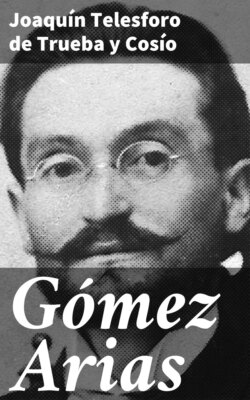Читать книгу Gómez Arias - Joaquín Telesforo de Trueba y Cosío - Страница 4
На сайте Литреса книга снята с продажи.
PREFACE.
ОглавлениеTable of Contents
Let me intreat the reader not to be alarmed at the hacknied word, which generally augurs that a person is going to be very egotistical and prosy. This, at least, it will be my ambition to avoid. Nor is it my intention to assume its literary prerogatives in any way as a mask for a sort of mock humility, endeavouring to impose upon good-natured persons by protestations of demerits, want of experience and talent, with that long series of et ceteras with which a writer generally opens his first campaign.
The public has nothing to do with an exculpatory doctrine, which carries with it the aggravating circumstance of not being sincere; for I am sure that no man, with a moderate share of common sense, will suppose that an author really believes the accusation he so humbly utters against himself. Could he indeed persuade himself that his book was so very indifferent a performance, he might assuredly more justly accuse himself of acting the part of an unnatural parent in thus gratuitously exposing his intellectual offspring to the neglect and compassion of the world.
Besides, when an author presents his readers with this stultifying catalogue of demerits, he supplies them with the very best reasons to retort upon him:—"Good heavens; if the man has neither talents nor information, why does he write at all?" Having thus waved my claims to any similar indulgence, it only remains for me to say a few words respecting the origin and the object of the following Romance.
As an enthusiastic admirer of the lofty genius, the delightful and vivid creations of that great founder of English historical fiction, Sir Walter Scott, it often struck me, while reading his enchanting novels, as rather singular that he had never availed himself of the beautiful and inexhaustible materials for works upon a similar plan to be met with in Spain. It has, indeed, been generally admitted that Spain was the classic ground of chivalry and romance. The long dominion of the Moors—the striking contrast between their religion, their customs and manners, and those of their Christian enemy—the different petty kingdoms into which Spain was divided, with the consequent feuds, intrigues and battles,—all concurred to produce a succession of extraordinary incidents and character, highly adapted for romantic and dramatic illustration. Yet, while the less abundant chronicles and traditions of England, Scotland, Ireland and France, were successively ransacked by the great magician and his most successful imitators, they seem almost studiously to have avoided dwelling upon those glowing, luxuriant productions, replete with such variety of incident and character, which form the national treasures of Spain.
Conceiving, then, that I had the same right as any one else to spoil, if I failed to give attraction to a fine subject, I found that my ideas were further confirmed by the encouragement of some of the most eminent amongst my fellow-countrymen. I accordingly engaged in the undertaking, the result of which is the following Romance.
With regard to the hero, I cannot well determine whether he ever existed or not. In spite of my researches, I have no other authority for his reality than the well known comedy of the celebrated Calderon de la Barca, entitled "La niña de Gomez Arias." The probability is, that Calderon took the hint of this comedy, according to a generally prevailing custom in his time, from some legend or tradition now lost. Be this as it may, it is enough that such characters as Gomez Arias are unfortunately within the pale of human nature. I have endeavoured, however, to soften the character, as it is depicted, from that of an utterly abandoned libertine into a man of extraordinary ambition; for great passions, though they cannot palliate crime, are nevertheless not inconsistent with a dereliction of moral and legal ties.
To conclude my prefatory reasons for not writing a long preface, there is one point on which I am anxious to appeal to the indulgence of my readers. It is obvious that the work being written in English by a Spaniard, must bear some traces of its foreign descent. In extenuation of these unavoidable faults of style and language, I can only entreat that the English public will extend the same generous sympathy and benevolence to the errors of the author, which it has already evinced, in far more important matters, on behalf of his unfortunate fellow-countrymen.
